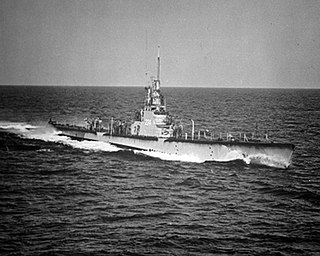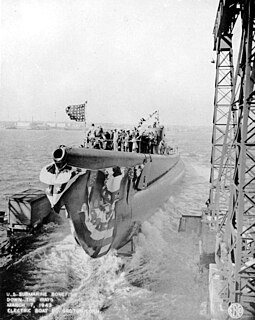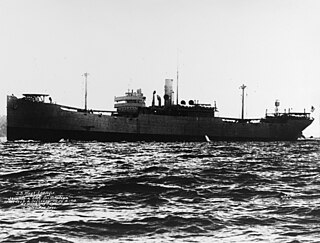
USS Cod (SS/AGSS/IXSS-224) is a Gato-class submarine, the only vessel of the United States Navy to be named for the cod, an important and very popular food fish of the North Atlantic and North Pacific.

USS Bonefish (SS-223) was a Gato-class submarine, the first United States Navy ship to be named for the bonefish.

USS Aspro (SS/AGSS-309), a Balao-class submarine, was the first ship of the United States Navy to be named for the aspro, a fish found abundantly in the upper Rhône River. According to legend, the aspro comes to the surface only in bad weather, when other fishes take refuge near the bottom. This trait gave rise to its nickname, "Sorcerer."

USS Monadnock (ACM-10) was a coastal minelayer in the U.S. Navy, the third vessel named after Mount Monadnock, a solitary mountain (monadnock) of more than 3,100 feet in southern New Hampshire close to the border of Massachusetts. The ship was built as the cargo vessel Cavalier for the Philadelphia and Norfolk Steamship Company by Pusey and Jones Corporation, Wilmington, Delaware in 1938. The Navy purchased the ship 9 June 1941 for wartime use. After decommissioning the ship was sold in June 1947 for commercial use then sold to a Panamanian company in 1949 to be renamed Karukara. In 1952 the ship became Monte de la Esperanza for a company in Bilbao, Spain transporting bananas to the United Kingdom from the Canary Islands for more than 20 years. She was later sold to the Marine Institute of Spain for operation as a hospital ship for more than 10 years serving the fishing fleet of the Canary Islands as Esperanza del Mar until becoming an artificial reef off Spain in 2000.

The SS Empire Miniver was a British steam merchant ship. She was originally an American merchant, launched in 1918 as SS West Cobalt. During a brief stint in the United States Navy in 1919, she was known as USS West Cobalt (ID-3836).

The SS Mohegan was a steamer which sank off the coast of the Lizard Peninsula, Cornwall, on her second voyage. She hit The Manacles on 14 October 1898 with the loss of 106 out of 197 on board.

USS West Lianga (ID-2758) was a cargo ship for the United States Navy during World War I. She was later known as SS Helen Whittier and SS Kalani in civilian service under American registry, as SS Empire Cheetah under British registry, and as SS Hobbema under Dutch registry.

USS West Ekonk (ID-3313) was a cargo ship for the United States Navy during World War I. She was later known as SS West Ekonk in civilian service under American registry, and as SS Empire Wildebeeste under British registry.
Britannia may refer to any one of a large number of ships:
Numerous ships have been named Marquis of Rockingham, or Marquess of Rockingham:

USS West Haven (ID-2159) was a steel–hulled freighter that saw service with the U.S. Navy during World War I, and which later saw convoy service during the Battle of the Atlantic in World War II.
Several vessels have been named Thames, for the River Thames:
A number of sailing vessels were named Alexander:
Several vessels have been named Paragon:
Several ships have been named Sesostris for Sesostris:

Eddystone was launched at Hull in 1802. She then sailed for the North West Company. The French Navy captured her in 1806 but an armed ship of the Royal Navy recaptured her within weeks. She next sailed for the Hudson's Bay Company (HBC) from 1807 to about 1824. She then traded generally until May 1843 when she was wrecked.
Several vessels have been named Walmer Castle for Walmer Castle:
This page is based on this
Wikipedia article Text is available under the
CC BY-SA 4.0 license; additional terms may apply.
Images, videos and audio are available under their respective licenses.









